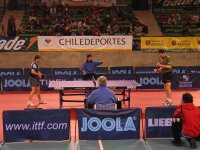This user has no status.
This user has no status.
Member
Hi all, looking for some advice...
Was watching my (11 year-old) son play yesterday and noticed that against stronger players he was getting forced away from the table and ending up in a long loopy rally that he would more often than not lose.
To me this seems like a bad approach, mainly as a result of tightening the angles he can play, and ideally he should either stay closer to the table or if he gets forced away, work his way back (somehow). He has a good blocking game when he needs it so I can't see why he should even be forced away.
Any ideas or tips here ? He has the shots to beat these players, just lacks techniques to get or stay in position to play them.
Thanks !
* as usual I may be completely wrong !
Was watching my (11 year-old) son play yesterday and noticed that against stronger players he was getting forced away from the table and ending up in a long loopy rally that he would more often than not lose.
To me this seems like a bad approach, mainly as a result of tightening the angles he can play, and ideally he should either stay closer to the table or if he gets forced away, work his way back (somehow). He has a good blocking game when he needs it so I can't see why he should even be forced away.
Any ideas or tips here ? He has the shots to beat these players, just lacks techniques to get or stay in position to play them.
Thanks !
* as usual I may be completely wrong !












